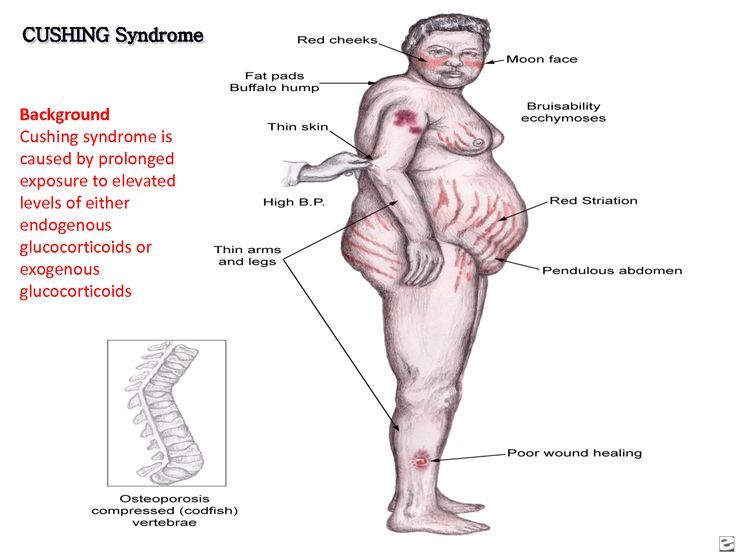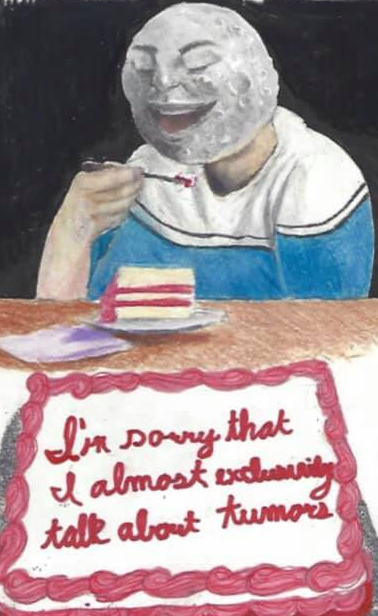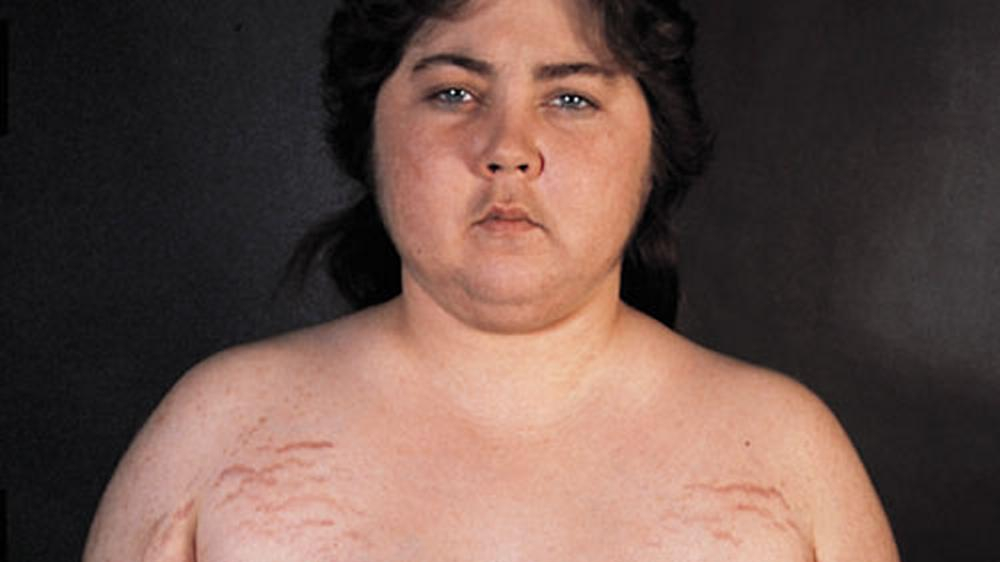Cushing’s Syndrome, or Cushing’s Disease, is a term that describes the effects of hypercortisolism. That’s when you have way too much cortisol – the stress hormone – in your body. You can have endogenous Cushing’s if your body produces too much cortisol because of a pituitary tumor, an adrenal problem, or from some other internal cause, or you can get exogenous Cushing’s from taking medications that contain synthetic cortisol, such as Prednisone or other corticosteroids.
On episode 4 of the ConverSapiens podcast, Cushing’s survivors Shauna Nelson, Kelsey Zeman, and Caleb Wilemon discuss hypercortisolism. In the following excerpts from the show, they describe their experiences with 10 common symptoms of Cushing’s.
1. Uncontrollable Weight Gain
“For me, I gained about 75 or 80 pounds in the span of six months. It’s very frustrating because cortisol changes your metabolism. Your body converts everything you eat into stored fat because it thinks you are in fight or flight mode. From the outside, people see that weight gain as something that’s resulting from lifestyle choices you must be making.” -Caleb
“I gained about 70 pounds over the course of three years. I actually had two surgeries for Cushing’s and 15 of those pounds were gained between the two surgeries, which was over a very short amount of time.” -Kelsey
“I gained about about 150 pounds over overall. We’ve all been taught calories in calories out, but there is some wrinkle in that. It’s not a failure of the person – it’s literally the cortisol taking over everything.” -Shauna
2. Moon Face & Buffalo Hump
“Moon face is a common symptom where your cheeks will puff up and your face becomes round from new fat deposits caused by the cortisol. My face blew up like a balloon! It’s still a little puffy to this day. I also had a buffalo hump, which a hump of fat that appears between your shoulder blades on your back. I really think they consulted the schoolyard bully to come up with these terms sometimes.” -Caleb
“I did have moon face swelling under the chin and cheeks and everything. I also had a buffalo hump, but I always wear my hair down, so my endocrinologist never saw it. It was actually one of my friends who’s in med school that pointed it out. She noticed it and told me, ‘Yeah, that’s another symptom of Cushing’s.’ I was like… go figure!” -Kelsey
“You could look at me straight on and not see my ears like you can today! I definitely had the buffalo hump too, as well as fat deposits everywhere, even around my clavicles.” -Shauna
3. Stretch Marks (Striae)
“Striae are large pink, purple or reddish stretch marks that can be from a quarter inch to a full inch or more wide. While most associate “stretch marks” with weight gain (and that is a contributing factor) Cushing’s striae are exceptionally large and they’re caused by the dermis losing its natural elasticity due to an interaction with the cortisol. That’s why you don’t see guys with beer guts at the beach covered in them like a Cushing’s patient. I have them all over my abdomen, my upper arms and thighs.” -Caleb
“For me, I did not experience that symptom until after my first surgery because most of my weight gain before surgery was pretty slow going. But then, since I did gain more weight so rapidly after my first surgery, I developed striae.” -Kelsey
“I got them. Not too bad, all things considered, but mine were mostly lower abdomen down through the top part of my thighs. It’s been 20 something years for me since I had active Cushing’s, so they’ve definitely lightened. They’ve lightened to the point that I know where they are, but I don’t think a stranger can pick them out, which is good.” -Shauna

4. Hair Change or Hair Loss
“We all know a mom who experienced hair changes during pregnancy because of hormonal changes. Cushing’s can have those same effects. My hair has a natural wave to it, but during Cushing’s, it became almost curly. There was a big curl right on top of my head that appeared and then later went away after my Cushing’s was over. The hair on my arms and legs also got really thick. Hair started growing on my hands, and that had never happened before. I felt like I was becoming a werewolf!” -Caleb
“The hair on my head definitely got thinner and over time it started breaking off and falling out more. I didn’t get too many other hair changes. The hair on my face got a little bit thicker but it was nothing too noticeable.” -Kelsey
“I had a curly hair, like ringlet curly hair! After going through all the Cushing’s stuff, it’s straight. I’ve heard of a lot of people going through the opposite where they had straight hair before and now they have curly hair.” -Shauna
5. Skin Problems
“Besides the striae, Cushing’s can cause other skin problems, including acne, easy bruising, slowed healing and increased skin sensitivity. I was really lucky to not experience any of those symptoms, that I can remember.” – Caleb
“I did experience an increase in acne. There was some on my back and my chest and a lot more on my face. That’s actually one of the first symptoms that has started clearing up after my second surgery. I also experienced a really heightened sensitivity to touch. If someone squeezed my arm even slightly it would hurt really bad. It was like that all over my body. I later learned that’s because Cushing’s can also cause nerve inflammation.” -Kelsey
“There was no increase in acne for me, but it did slow my natural healing. If I cut myself by accident, I’d notice that it didn’t heal as quickly as before. I also bruised more easily, to a certain extent, but not as badly as I’ve known others to experience. For some people with Cushing’s, if their cat jumps on their lap they will have bruises everywhere that cat walked on them.” -Shauna
6. Chronic Fatigue & Muscle Atrophy
“Fatigue and even muscle loss are very common in Cushing’s patients. A thing called glucocorticoid-induced muscle atrophy happens in 60% or more of people with hypercortisolism, which is a fancy way of saying your muscles become weak. For me, I had both chronic fatigue and muscle loss during Cushing’s. I was always tired and would come in from my job each day and lay down for a few hours. The muscle loss also made me sore constantly, like I had just worked out. It was miserable.” -Caleb
“I definitely had severe fatigue. At one point during my Cushing’s experience I was working with kids, so I was always having to be up and down, running around. I thought that’s what I was getting fatigued from, but I was always tired, always exhausted. It was actually the effects of Cushing’s.” – Kelsey
“I had an exercise intolerance with mine. I got Cushing’s when I was probably around 25. At the time I was healthy and active, then Cushing’s hit and I was literally exhausted all the time. If you asked me to walk like a mile, you would think I was climbing Everest. It was more than my body could do.” -Shauna

7. Insomnia
“Insomnia is an extremely common symptom of hypercortisolism. I would go to bed normally but I would toss and turn the entire night. I eventually got to the point where I would just get up and turn on my lamp to read because sleep was just impossible. Then two nights later I might sleep ‘normally’ because my body was so exhausted. It’s a constant cycle of being sleep deprived by this hormone that is basically telling your body that you’re in danger. Your body thinks you need get out of here when really you just need to sleep.” -Caleb
“I did have insomnia too. I had a lot of trouble sleeping during Cushing’s.” -Kelsey
“Insomnia is a given for Cushing’s patients. Our cortisol is lowest in the morning. For normal people, their cortisol starts out high and kind of goes down throughout the day. Ours starts out low and gets higher through the day, so its highest at bedtime. You’re never going to sleep with cortisol raging.” -Shauna
8. Anxiety & Depression
“Not all the symptoms of Cushing’s are physical. Cortisol has a lot of unpleasant psychological effects as well. Since it is ‘the stress hormone’ and forms a part of the cocktail of hormones that make up the fight or flight response, it puts your body in a physiological state of stress, whether you are in an otherwise stressful situation or not. Logically, it can cause anxiety because of that. I definitely experienced increased anxiety in general during my Cushing’s. Some people also experience depression, apathy, or other mental health issues caused by excess cortisol.” -Caleb
“Before Cushing’s I was already dealing with depression and anxiety, but I was on a really good medication regimen for that and things were under control. Once my symptoms started, anxiety and depression got a lot worse. At first I blamed that on grad school because I was very stressed all the time, but I noticed I was more stressed than any of my classmates. It wasn’t because I was having a harder time or anything, it was just because of the elevated cortisol.” -Kelsey
“Cortisol made me have a lot of apathy. I didn’t really care. You want to go out to a restaurant? Yeah, whatever. You wanted to clean the kitchen? Whatever. I didn’t care what happened. I remember thinking one day, I haven’t laughed in a long time. And I hadn’t! I hadn’t laughed in months. It was kind of a sudden realization and I thought… that’s not normal. People laugh. People laugh and have a range of emotions.” -Shauna
9. Increased Irritability (Cushing’s Rage)
“Hypercortisolism can give you a sense of rage that can almost take over at times. I first identified it one day when I was coming home from work and a guy cut me off in traffic. Anyone would be a little peeved, but I was so enraged by it. I was screaming and cussing at this guy, and it was like I could feel my blood pressure skyrocketing. I pulled over and I had to take a deep breath, which is something that has never happened for me. When I got home, I took my blood pressure and it was 199 over 100.” -Caleb
“I was more irritable than usual during Cushing’s. I’m hoping not too much…. but I’d say definitely a little bit more irritable. Other than that, I didn’t really notice any major personality changes, fortunately.” -Kelsey
“I had the Cushing’s rage inside of me. I was so angry at everything, and nothing was wrong. My life was great! I don’t know exactly how to explain it, but you get this kind of undercurrent of anger. I felt as though this world is really out to get me as a result.” -Shauna

10. Impaired Memory & Concentration
“During Cushing’s my short term memory left me completely. I had to pass my sister’s house to get to work and I remember there was one week when I was going to go by and grab something from her. Every day I told her I’d swing by on the way home from work and every day I would come straight home. It would only hit me that I had forgotten again at night when she would text me about it. It was completely gone from my memory. Stuff like that happened all the time for me.” -Caleb
“Memory and concentration were really poor for me. I was interning at a hospital all night at the time of my Cushing’s. I would have to write some of my chart notes at the end of the day because I didn’t have time to write them right after seeing the patient, and I would just sit there at the computer trying so hard to remember what happened during the appointments or during the meetings, but it just completely left me.” -Kelsey
“Long term memory is spotty, and my concentration can be all over the place unless I really focus. My long term memory is bad. I don’t remember major life events without reminders and some are just lost.” -Shauna
Diabetes, Psychosis, Osteoporosis, etc.
There are many other symptoms of Cushing’s, such as type 2 diabetes that requires insulin to control until the hypercortisolism is successfully treated. Another rare disorder is actual psychosis. While that symptom isn’t extremely common, there has been research suggesting that Cushing’s patients experiencing the psychological effects of cortisol are routinely misdiagnosed with bipolar and other mental health issues that are only symptoms, not the root cause of their problems. Cushing’s patients often have to get bone density tests and scans as well, as the heightened cortisol can lead to osteonecrosis, the death of bone tissue that results in the same effects seen in osteoporosis patients, which could leave them needing joint replacements or permanently disabled.
Cushing’s is an awful condition. If you are experiencing any of the symptoms mentioned here and you haven’t been diagnosed, contact your doctor and try to get an appointment with an endocrinologist, if at all possible. If you have been diagnosed with Cushing’s, learn all that you can about the disease and become a self advocate. The medical profession often overlooks patients with hypercortisolism. Take note of your symptoms and research them, talk to other survivors in support groups like “The Many Faces of Cushing’s” on Facebook, and help guide your doctors in the right direction where it is necessary by becoming informed and articulate regarding your condition.
